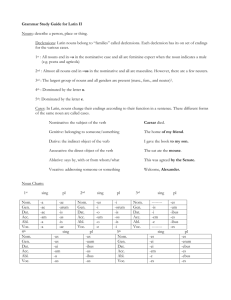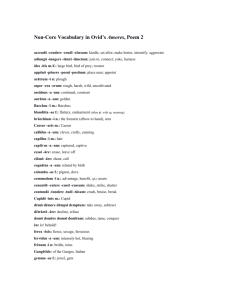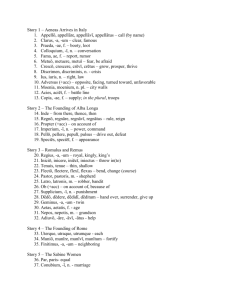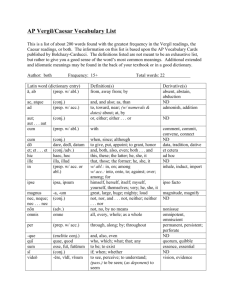Noun declensions: 1 st
advertisement
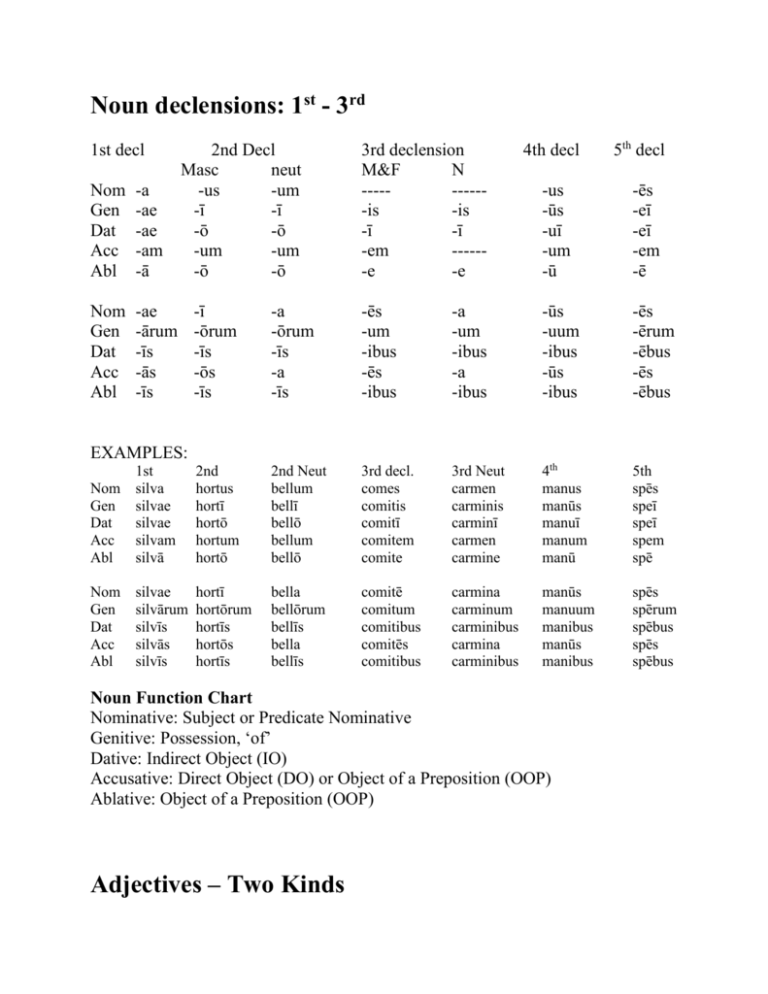
Noun declensions: 1st - 3rd 1st decl Nom Gen Dat Acc Abl -a -ae -ae -am -ā Nom Gen Dat Acc Abl -ae -ārum -īs -ās -īs 2nd Decl Masc neut -us -um -ī -ī -ō -ō -um -um -ō -ō 3rd declension M&F N ----------is -is -ī -ī -em ------e -e 4th decl 5th decl -us -ūs -uī -um -ū -ēs -eī -eī -em -ē -ī -ōrum -īs -ōs -īs -a -ōrum -īs -a -īs -ēs -um -ibus -ēs -ibus -a -um -ibus -a -ibus -ūs -uum -ibus -ūs -ibus -ēs -ērum -ēbus -ēs -ēbus Nom Gen Dat Acc Abl 1st silva silvae silvae silvam silvā 2nd hortus hortī hortō hortum hortō 2nd Neut bellum bellī bellō bellum bellō 3rd decl. comes comitis comitī comitem comite 3rd Neut carmen carminis carminī carmen carmine 4th manus manūs manuī manum manū 5th spēs speī speī spem spē Nom Gen Dat Acc Abl silvae silvārum silvīs silvās silvīs hortī hortōrum hortīs hortōs hortīs bella bellōrum bellīs bella bellīs comitē comitum comitibus comitēs comitibus carmina carminum carminibus carmina carminibus manūs manuum manibus manūs manibus spēs spērum spēbus spēs spēbus EXAMPLES: Noun Function Chart Nominative: Subject or Predicate Nominative Genitive: Possession, ‘of’ Dative: Indirect Object (IO) Accusative: Direct Object (DO) or Object of a Preposition (OOP) Ablative: Object of a Preposition (OOP) Adjectives – Two Kinds 1st & 2nd Declension Adjectives Singular Nom Gen Dat Acc Abl M latus latī latō latum latō F lata latae latae latam latā N latum latī latō latum latō Plural Nom Gen Dat Acc Abl latī latōrum latīs latōs latīs latae latārum latīs latās latīs lata latōrum latīs lata latīs 3rd Declension Adjectives NB: Ablative singular is –ī instead of –e Singular Nom Gen Dat Acc Abl M fortis fortis fortī fortem fortī F fortis fortis fortī fortem fortī N forte fortis fortī forte fortī Plural Nom Gen Dat Acc Abl fortēs fortium fortibus fortēs fortibus fortēs fortium fortibus fortēs fortibus fortia fortium fortibus fortia fortibus Demonstratives: adjectives/pronouns ille, illa, illud Adjective (with a noun): that/those Pronoun (by itself): he/she/it/they etc. ille illius illī illum illō illa illius illī illam illā illud illius illī illud illō illī illōrum illīs illōs illīs illae illārum illīs illās illīs illa illōrum illīs illa illīs hic, haec, hoc Adjective (with a noun): this/these Pronoun (by itself): he/she/it/they etc. hic huius huic hunc hōc haec huius huic hanc hāc hoc huius huic hoc hōc hī hōrum hīs hōs hīs hae hārum hīs hās hīs haec hōrum hīs haec hīs Personal pronouns 1st person singular ego meī mihi me me I of me to me me me 1st person plural nōs nostrum nobīs nōs nobīs we of us to us us us 2nd person singular tu tuī tibi te te you of you to you you you 2nd person plural vōs vestrum vobīs vōs vobīs you of you to you you you 3rd person Pronoun Adjective is eius eī eum eō ea eius eī eam eā id eius eī id eō he she it his, hers, its to him/her/it him/her/it him/her/it this/that this/that this/that this/that this/that eī eōrum eīs eōs eīs eae eārum eīs eās eīs ea eōrum eīs ea eīs they their to them them them these/those these/those these, those these/those these/those Verb Basics conjugations 1st conj: -ō, -āre [amō, amāre…vocō, vocāre…] 2nd conj: -eō, -ēre [teneō, tenēre…videō, -ēre…] 3rd conj: -ō, -ere [ducō, -ere…resistō, -ere…] 3rd conj ‘io’: -iō, -ere [capiō, capere…cupiō, cupere…] 4th conj: -iō, -īre [veniō, venīre…audiō, -īre…] Personal endings: 1st pers. sing: -ō, -m 2nd pers. sing: -s 3rd pers. sing: -t 1st pers. pl: -mus 2nd pers. sing: -tis 3rd pers. sing: -nt =I = you = he/she/it = we = you (pl) = they Imperative/Command forms 1st conj. sing: -a pl: -ate 2nd conj. sing: -e pl: -ete 3rd conj. sing: -e pl: -ite 3rd conj. ‘io’ sing: -e pl: -ite 4th conj. sing: -ī pl: -ite Exceptions in singular only: duc (not duce), fac (not face) dic (not dice) Miscellaneous Cool Stuff… Ablative 8: ab (a) – from/away from, de – from/down from/ about, ex (e) – from/out of, cum - with, sine - without, in – in/on, sub - under, pro - for Give, Show, Tell (GST) verbs that take a dative indirect object: Give: dō - give, tradō – hand over, reddō – return/give back, dedō – give up Show: ostendō – show, demonstrō – show, doceō- teach, Tell: narrō – tell, dicō – say, respondeō, recitō – recite, canō – sing, cantō – sing Common verbs that take a complimentary infinitive: possum – be able, debeō – ought/must, constituō – decide, cupiō – want, amō – love/like, iubeō – order, temptō - try/attempt, volō – be willing, nolō – be unwilling, parō – prepare, cogo – force/compel, sinō – allow Verbs that take the dative instead of the accusative in book 1: occurrō – meet, succurrō – help, imperō – order, resistō – resist, invideō – envy/be jealous of, placeō – please




